Kagi status update: First three years
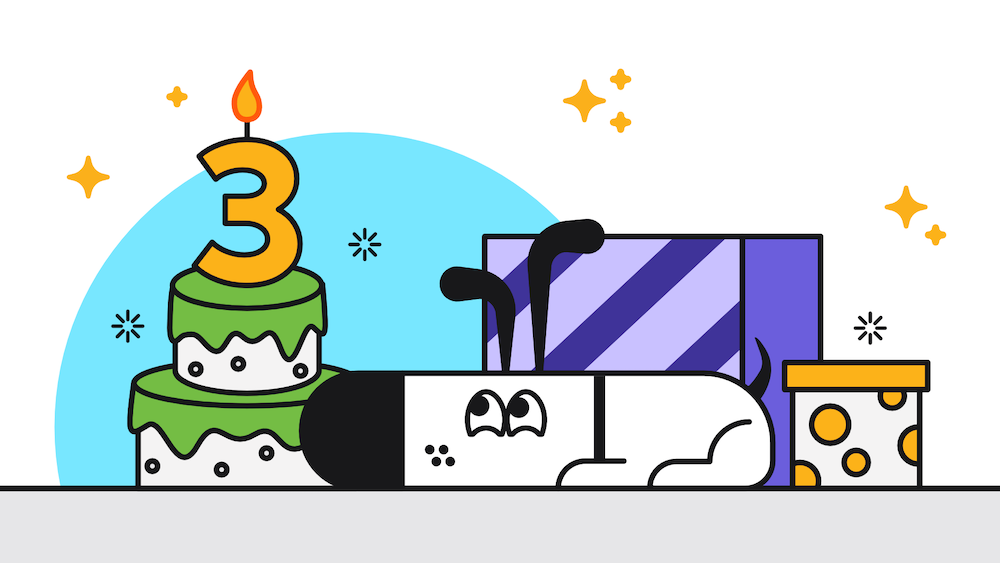
Three years ago, Kagi officially launched with a splash on popular technology forum Hacker News (to which we are eternally grateful for helping put Kagi on the map). The top comment in the thread said:
I’ve been evaluating Kagi for a couple weeks, I’m liking it, but today I’m completely sold. I’ve been doing a niche, technical search this morning: trying to figure out if Emacs and TRAMP can be made to work with flatpak-spawn.
Google returned a ton of unrelated posts and I had to tell it to stop ignoring my search terms. Kagi returned the only relevant page: a comment on a Github issue that Google wasn’t able to find, and no other fluff, because that particular combination of words doesn’t exist anywhere else on the Internet.
And it very much describes the core reason Kagi exists: Driven by relentless ad-based monetization, Google and its peers have enshittified over the years. The social contract in which users get access to search results in exchange for giving their attention and data to advertisers has reached a tipping point, where the quality of those search results degraded over time to such levels that the trade does not make sense to a growing number of people (and it never did for many to begin with, but before Kagi brought an alternative business model, there were no other options to choose from).
210 people became Kagi customers on that very first day, and out of them 121 still remain customers to this day. If you are one of these 121, and you read this, we recognize and appreciate your support.
We thought we’d give you a full status update on where we are.
Our story in milestones
We have come a long way since introducing Kagi Search and Orion Browser as a public beta in 2022. What started as a quiet rebellion against ad-driven search engines tracking your every click became a complete dedication to building an alternative, humane web.
We launched Small Web and Summarizer a year later, adding unique value to the Kagi Search experience. In the same year, 2023, we worked on our pricing strategy. Introducing a Family plan, and eventually, launching unlimited Kagi searches for $10 per month. Something that seemed like an incremental step proved to be a great leap in the right direction - helping us reach 20,000 members by early 2024.
Last year was even bigger and bolder. We adhere to a philosophy of using AI to enhance rather than create the search experience. With that notion in mind, we launched Assistant, a customizable, privacy-conscious platform for multiple LLMs with access to Kagi Search. Then Translate joined our suite of tools, with the modest idea of being a better translation service that supports more languages. Based on your feedback, we did it and it quickly became a fan favorite.
This year, we focused on reinforcing core values around Kagi. With Privacy Pass rolling out, you can access the services without identifying yourself or linking searches to your account. By introducing Fair Pricing, we held true to our conviction that you should pay for a service you use, prioritizing your experience over profit margins.
We aim to see Kagi in more homes, offices, and especially the education sector, and are building programs and refining our products to make that happen.
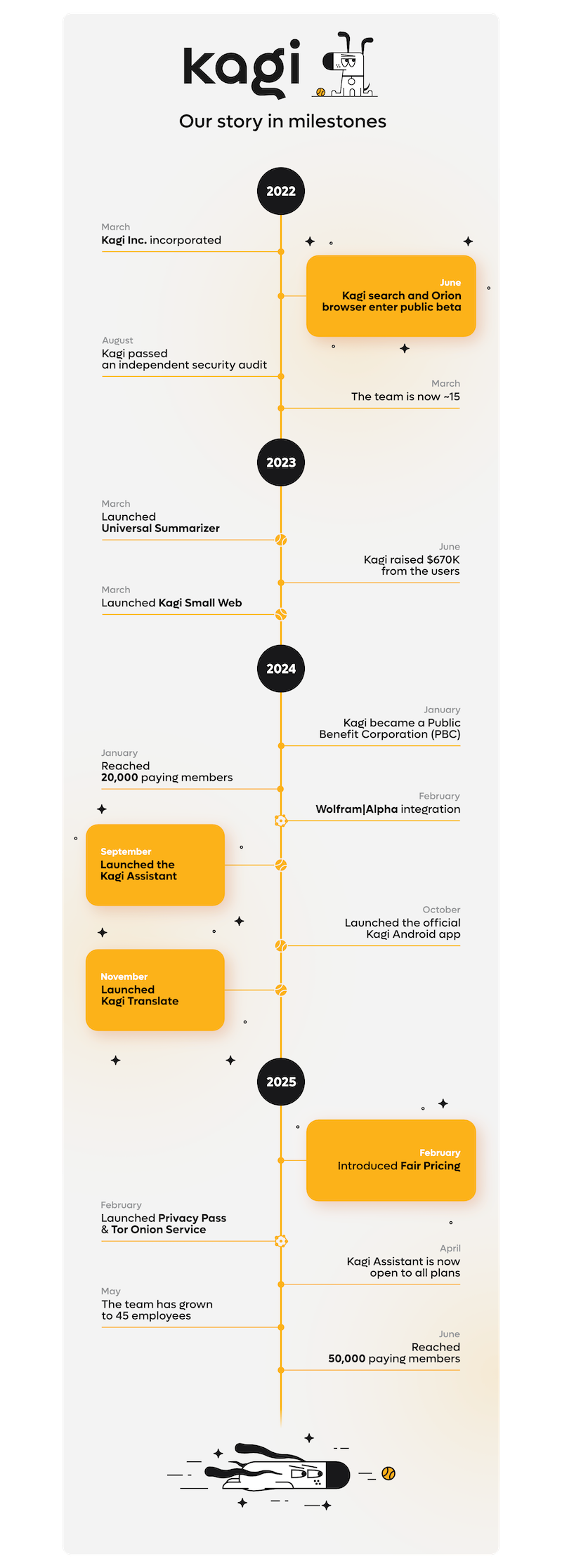
Recent product updates
During the year, we worked on reinforcing our philosophy of a better, safer, and more humane web by improving Kagi products.
Kagi Search welcomed significant improvements. We’ve made video search smarter and more user-friendly, with features such as the ability to view previews with real video screenshots instead of misleading thumbnails and customize how titles appear. These updates help you focus on meaningful content and avoid clickbait.
We’ve also added more source filters for videos to help you find exactly what you’re looking for, faster. This includes additions like filtering specifically for TikTok videos or PeerTube results alongside other sources:
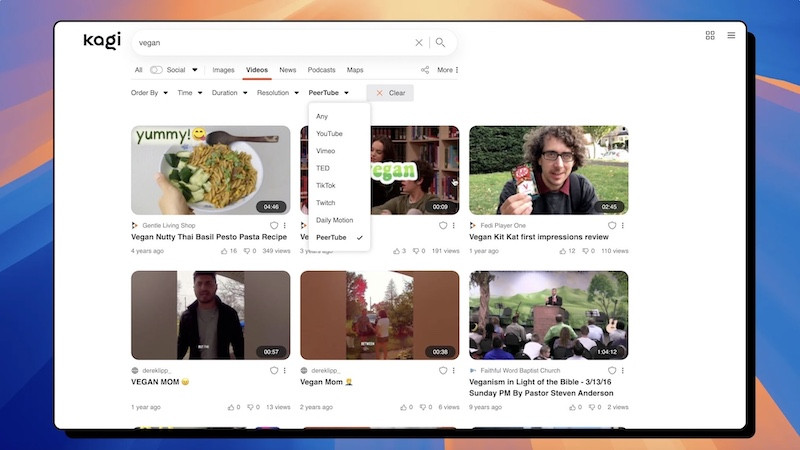
Kagi’s image search saw notable improvements to include additional sources like Openverse for openly licensed images and a dedicated SVG filter as an option.
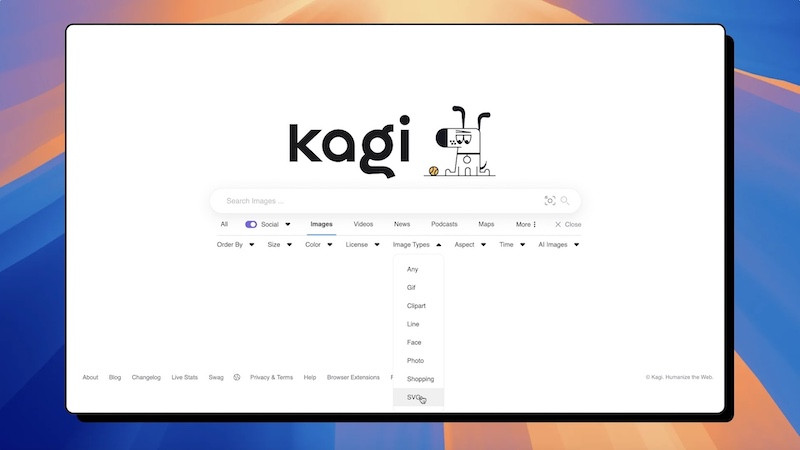
Image search upgrades also include generative AI-image detection and flagging, and the ability to filter AI-generated images in results. This feature was so popular that due to community demand, we added a setting option to hide AI-generated images by default.
Kagi Assistant has become a favorite among users because it offers seamless access to the world’s leading large language models, grounded in Kagi Search, within a single, elegant interface. At the beginning of the year, we published a new privacy guide that fully discloses the LLM providers used by the Assistant and their data privacy policies.
We kept adding some of the most valued LLMs including those from Anthropic, OpenAI, Mistral AI, Google, Meta, Alibaba, Amazon, and xAI.
A few weeks ago, we made Assistant available in all plans. At the same time, we began to enforce our fair use policy to ensure a sustainable, high-quality service for everyone.
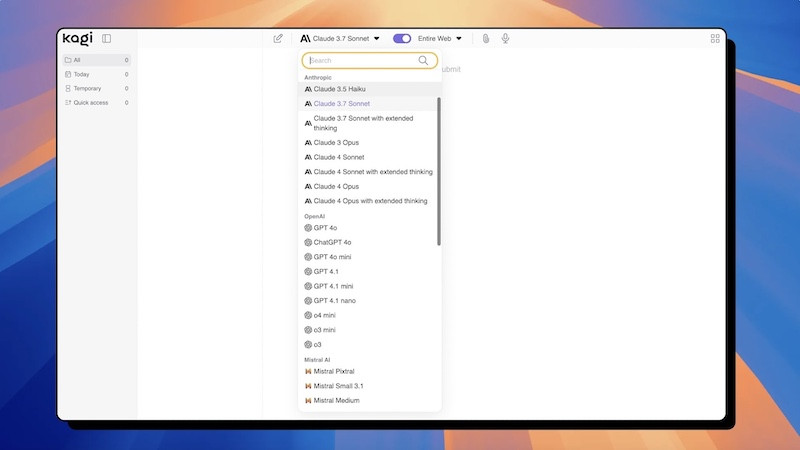
Kagi Translate has a completely redesigned interface with features like context-aware translations, automatic language detection, voice translations with gender options, and multiple alternative translations for better accuracy. You can use it to translate or proofread text, instantly translate an uploaded document, or translate a website. Since January 2025, you can use Kagi Translate to translate search results directly from the search results page.
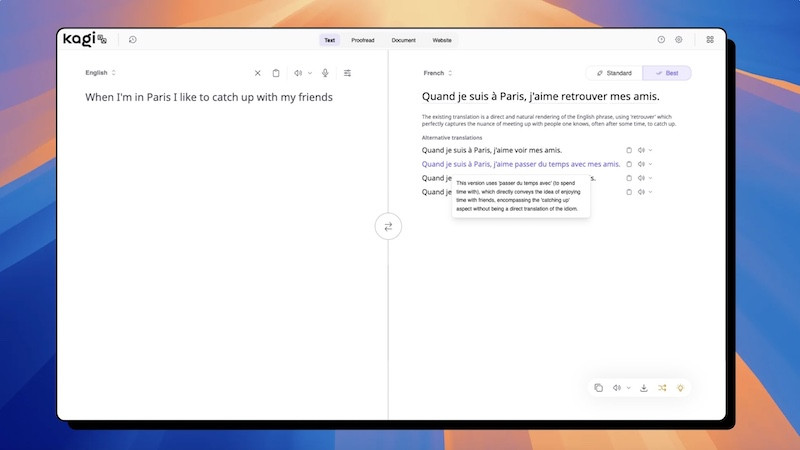
Orion Browser keeps getting praised by independent reviewers. In this independent telemetry test, Kagi’s Orion is listed amongst the winners for making 0 unsolicited network connections on start-up.
Our development of Orion Browser for Linux is in full swing as our target is to achieve full parity with the current macOS version by March 2026.
As always, our changelog is a treasure trove of information (and you can get it as an RSS feed too).
Master plan
From the day Kagi was conceived in 2019 it was clear that the only way to climb the giant mountain in front of us (going against one of the most ingrained habits in society and asking users to pay for something they had for “free” for decades) was to create an ecosystem of products and become a true ‘internet’ company. I defined that as a company that provides essential products and services for consuming the web. There are three such products that account for probably 90%+ of typical consumer usage: search, browser, and email.
Why is that important? Well simply put, if you just have search, and your customers use Chrome and Gmail, then your main competitor has important friction points they can use to win your customer back. (I italicized competitor, as technically Google and Kagi do not compete/share the same customers - ours are users of search while theirs are advertisers - but more on that below.)
In fact, there are only 5 companies in the entire world that offer a full-stack search, browser, and email product as part of their offering, forming an ecosystem for accessing the web.
| Company | Search Engine | Web Browser | Email Service | Ecosystem Monetization |
|---|---|---|---|---|
| Alphabet | Chrome | Gmail | Ads | |
| Microsoft | Bing | Edge | Outlook | Ads |
| Yandex | Yandex | Yandex Browser | Yandex Mail | Ads |
| Tencent | Sogou Search | QQ Browser & Sogou Browser | QQ Mail | Ads |
| Naver | Naver | Whale | Naver Mail | Ads |
What all these companies have in common is a fundamentally user-hostile business model (ads), the one in which users and the customers (that the product is optimized for) are different, which in turn causes fundamental misalignment of incentives and inevitably leads to enshitification that so many evidently feel today.
(As a side note - the one question that one should train to ask themselves whenever they see something offered for “free” is who is actually paying for it and why?)
Google has always been a B2B business - it was never a B2C business as much as they continue emphasizing ‘caring for the user’. This is evidenced by the fact that most of its revenue stems from advertisers, small and big. In this B2B framework, the primary product being transacted and sold has always been user data and attention.
My go-to quote that explains where this leads has been this gem by Ian Bremmer:

For something as ever so increasingly important as information consumption, a rational actor would not want to have intermediaries between them and the information provider. Information shapes our thoughts and behaviors, our professional work, our medical and financial decisions, and to have information we get influenced by who paid most for our attention is simply not acceptable.
Which brings us back to the reason why Kagi exists and what it is trying to achieve: to build a user-friendly ecosystem for consuming the web, the one that always puts the user first and liberates us and our families from the shackles of the attention economy that we have been trapped in for decades.
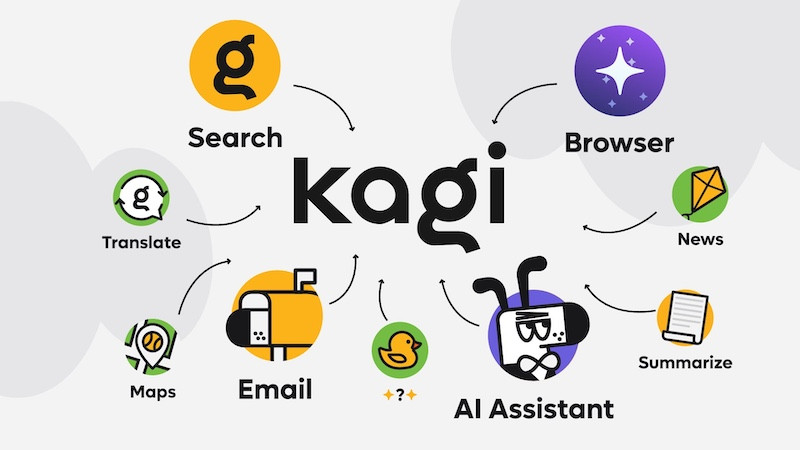
Kagi roadmap 2025
Kagi Mail
If Kagi building a browser was a surprise for many, then probably even fewer people know that I had product design documents for an email service going as far back as 2012.
As already discussed, from building an ecosystem perspective, email is a key component that completes the ‘holy trinity’ of search, browser, and email.
From a product portfolio perspective we see this as: Search is used to find knowledge, Browser is used to explore knowledge and Email is used to share knowledge. Doing this properly and in a well-integrated way is what inspires us.
Yes we know the core requirements for any email service: custom domain and alias support, robust spam filtering, standard protocol access, seamless migration tools, and unwavering reliability, but there is so much opportunity to offer more for an ecosystem company.
Why can you not search through your emails in your search engine (and AI assistant), and why can you not access search while writing your email? Why can you not send an email and get search results back (or a reply from an AI assistant)?
Why do all email AI assistants focus on summarizing and writing emails? (please do not send AI generated emails, others will be able to easily tell and it will be embarrassing - spelling and grammar check is OK.) How about instead being able to ‘filter all messages from John Wick and label them as work’?
Am I the only one who still emails myself when I want to put something on my to-do list (it makes sense, thanks to email being so ubiquitously accessible everywhere)? Why don’t email products recognize this important pattern of user behavior and give it the prime spot that it deserves?
Email has been conceived to connect humans, and now it is more about connecting spam and spammers to you. This has to stop too.
So even after so many years, email still leaves so much on the table. We hope to be able to give email that special Kagi user-centric “touch” of innovation that you all love in our Search and Browser products.
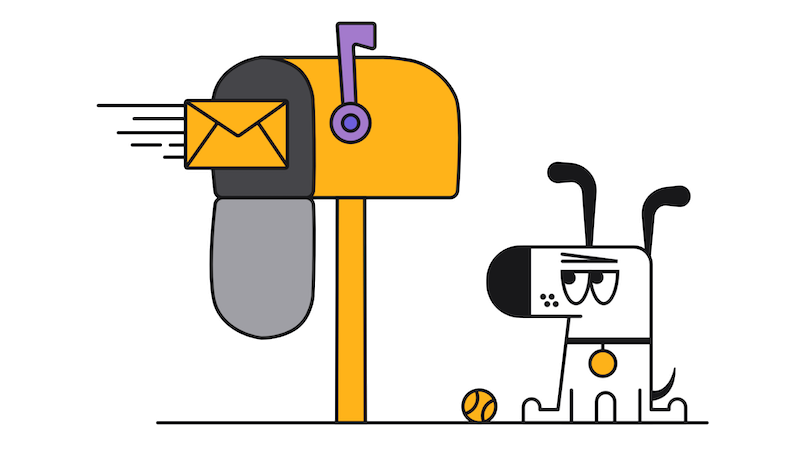
We are about 15% done and are ramping up our efforts. In fact, just last week, we have released access to the first (very, very early) preview of Kagi Mail with just bare basics in place to our distinguished members.
It is a monumental task, and there is much left to do, but that has been always our story since day one. We’ll get there.
Search API
What does search look like in the age of LLMs? It is becoming more important than ever. The usage is shifting from users to agents and while models from all the LLM frontier companies are converging to the same place, what will ultimately make the difference in the quality of answers given to the user is the quality and relevancy of search results fed to the model. And this has been Kagi’s bread and butter since day one.
We are working hard to officially bring our search API to the market. Our current version (v0) will be replaced by official (v1) during this summer.
We will bring Kagi’s legendary search result quality, specially optimized for consumption by LLMs, in an economically viable package.
To get notified when Kagi Search API launches please sign up here.
We already see huge demand and would like to open access to a handful of organizations in the coming weeks.
Kagi Assistant
Kagi Assistant offers a unique value proposition on the market: access to the world’s best LLMs, grounded in Kagi Search. For only $25/month, users can get the best LLMs and best search engine - all in one.
Our roadmap for this year features native desktop and mobile apps; user-controlled memory, allowing you to decide which information is stored; shared workspaces that enable teams to upload files, build ongoing research threads, and collaborate; enhanced integration with other tools through MCP; and a deep-research mode.
Orion Browser v1.0
Many people may not know that we started working on the browser before we started working on search.
Good news, after 6 years in active development, we have committed to exiting beta and officially launching Orion v1.0 in November this year. Between now and then we will be mostly focusing on stability: bug fixes, crashes and extension support. Please be patient, as many new features you all would like us to build will have to wait for after the 1.0 release.

Consider paying for your browser, and supporting Kagi. You can still get Orion+ Lifetime for $150 one-time fee and have this beautiful about screen dedicated to your support.
In parallel we have started building Orion for Linux. It is a monumental effort given that we are literally developing it from scratch (we cannot reuse any code/UI from Mac) and all that with a tiny team that has so many other balls to juggle. But there is no ecosystem without cross platform support, so there we are.

Orion for Linux in all its glory as of May 2025
We are committed to releasing the first version in March 2026, with dev updates and alpha releases you can follow by registering here.
What about Android/Windows? Well you’ll have to be patient (and send many more friends to Kagi so we can fund this eventually!).
Kagi Maps 1.0
Over the years mainstream map apps have gone through the same enshitification process as the rest of the information-consumption apps, focusing more on selling stuff versus being truly useful to the user. Even simple things that maps used to have, like a ruler to easily measure distance, are now gone from most map apps.
In our view, maps are primed for a ‘humanize the maps’ type of disruption. Let’s bring back the focus to exploration and local community (versus commercial). How about having useful layers in maps like wildfires and power outages?
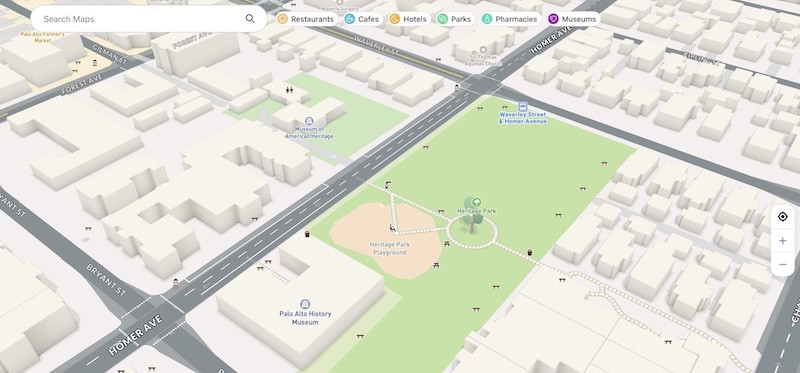
You can see early stages of this effort if you visit kagi.com/maps (recently updated) but there is still much to come - more work on the quality of the map data, map features, as well as native applications for desktop and mobile.
Kagi for Education
Last but not least, we are getting growing demand from educational institutions from all around the world. Kagi’s purpose is to inform and educate (not to sell ads), and this aligns well with the incentives of education.
And just recently, Google got hit with a lawsuit over how they collect data on school kids. The complaint claims Google is hoovering up way more than just basic educational records - they’re building detailed digital profiles of children. Even worse, the lawsuit says Google’s Chrome browser keeps tracking kids even when privacy settings are supposedly turned on. The plaintiffs argue Google then turns around and uses this data to make money, selling it to third parties.
Regardless of how this case ends, educators worldwide are starting to recognize the value of using a search product that aligns incentives between the school, kids and the information provider. Kagi has been designed from the ground up in a way that actually benefits the children and is designed for them (Kagi for Kids still remains the only search product experience created with focus on how kids use search).
To get notified when Kagi for Education launches or to express your interest, please sign up here.
Security and privacy
Security and privacy have always been the core of what we do at Kagi. We are proud that we had zero security incidents since inception and that Kagi’s privacy practices and innovation have been seen as the gold standard in the industry.
Privacy policy
Our privacy policy has been praised for its easy to understand language and being user-friendly. We collect only the minimum information necessary to provide our services and never sell or share your data with third parties. Our policy reflects our dedication to protecting your privacy at every step, and providing options for greater anonymity for those who need it.
Privacy Pass
This year, we reinforced our commitment to user privacy even further by integrating Privacy Pass and offering a Tor onion service. Privacy Pass ensures additional anonymity by making it technically impossible to link searches to user accounts, thanks to token-based authentication.
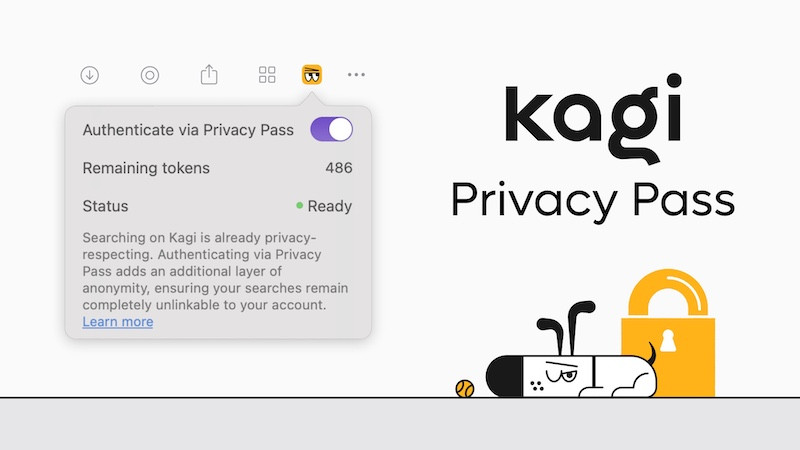
Security Bug bounty program
To help keep Kagi secure, we ran a full security audit and extended it with a prolific public bug bounty program that invites security researchers to responsibly report vulnerabilities. We reward community members who help us find and fix any such issues. This program reflects our ongoing pro-active commitment to the highest standards of user safety and continuous improvement in this area.
On accessibility
Making Kagi universally accessible is very important to us.
We strive to make our websites and products accessible to people with visual impairment and react with vigor whenever we receive reports on areas we can improve upon.
We have been extending our app and extensions portfolio to make sure that people can access Kagi from anywhere.
Despite this, platform lock-in is real and it makes it harder to access Kagi through user’s favorite products and service. For example Apple’s Safari does not allow users to edit the search engine.
Our strategy has been to try to work on Apple on this, and in the meantime push our own browser that will allow seamless access to Kagi. Orion for iOS/iPad is the first Kagi product to be downloaded more than one million times, with about 100k new downloads every month. This helped propel Orion for iPad into browser choice menu for Apple users in Europe. But this is not enough and if you are an Apple user you can reach out to Apple and request recognition and inclusion of Kagi in Safari.
A similar situation is on Android. For example, Android allows the selection search app for the default launcher widget, but Kagi isn’t selectable despite being installed. In Europe we need to compete for a top 8 spot with other search engines, and due to Kagi’s nature of being paid-only, this is all but impossible. We’d love to leave a Google contact page where you as a user could submit feedback to but unfortunately we could not find one. If you find one let us know and we will update the post.
On partnerships
We are just starting to flex our partnership muscle. At this time we are already exploring bundling opportunities with like minded companies, tighter integration with external service providers (both in Kagi, and Kagi into their service) and opening access to our APIs.
We’re open to finding new ways to create value through thoughtful collaboration. If you have ideas or proposals, we’d love to hear from you.
User impact
These testimonials remind us why we do what we do. We are deeply grateful for every user who has trusted us, supported us, and shared their experiences. The vast majority of our users discovered Kagi through word of mouth and your personal recommendations. By sharing them publicly, you’ve helped us grow, improve, and stay true to our vision.
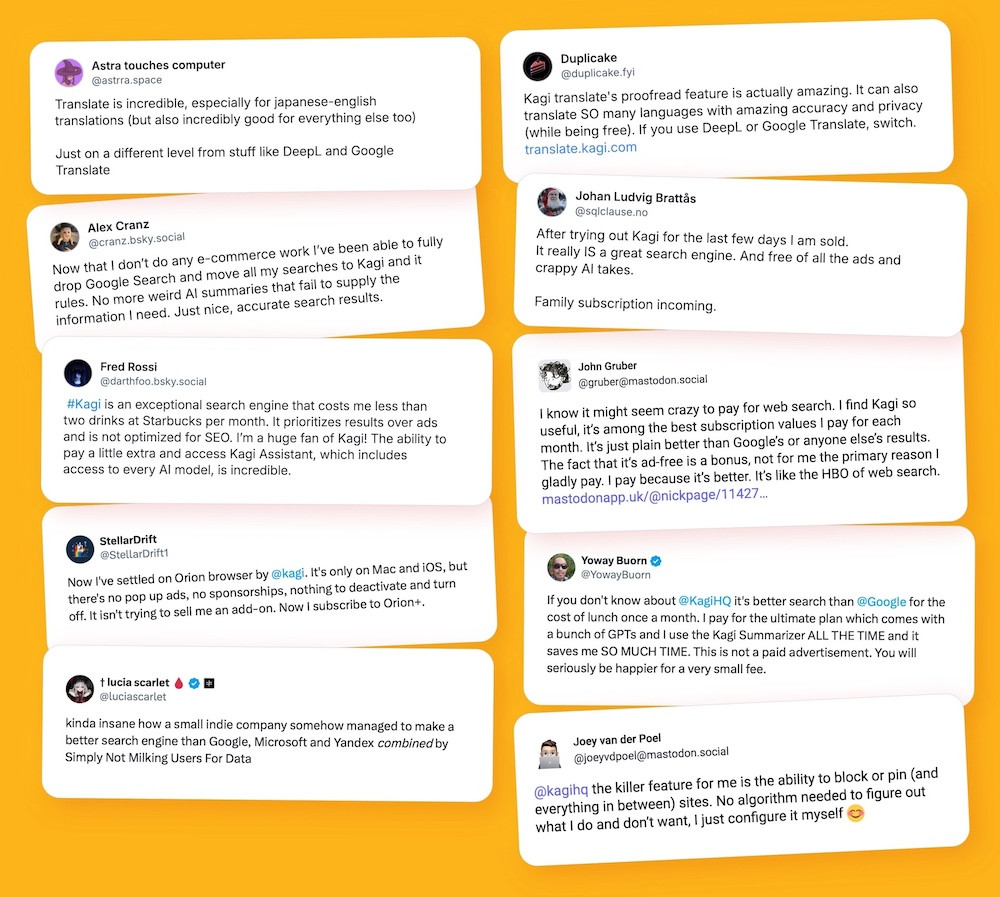
This one perhaps best describes the internal sense of pride and accomplishment everyone in the team shares:
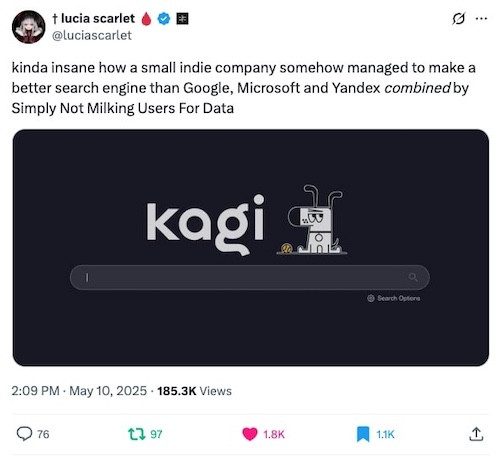
Getting involved and staying on top of updates
Join our Kagi Discord for day-to-day conversations with the team and other Kagi users. You can also find us on various social media platforms.
Our support email is support@kagi.com. Our user feedback sites, kagifeedback.org and orionfeedback.org are very active and are the right place to visit if you have any product feature suggestions or bug reports.
Subscribe to this blog’s RSS feed to get larger announcements. Our changelog is updated regularly, make sure to check it out when you see the bell notification in your dashboard.
So where are we?
This is an open-ended question, both interpretation and answer wise.
Some of the biggest tech influencers have embraced Kagi and we are starting to see signs of mainstream adoption.
And the seamlessly endless stream of praise we get on social media is charging our batteries every single day.
This has been amazing to witness and has given us so much in terms of confidence, determination and ability to continue our commitment to serve you.
Looking from the inside, in many ways Kagi still feels like a small and a friendly place it was on day one.
For example, I (Vlad, Kagi CEO) still actively maintain a few Kagi projects as a developer (Teclis, Small Web, …) and occasionally push commits to the main branch for kagi.com. Recently, I noticed that the main tagline on our home page was not nicely split into two lines and instead of bugging someone with a ticket, I thought I could just edit the localization file. Surely I checked and saw <br/> used in some other strings, so I thought it was safe to add it here too. (little did I know we sanitize all inputs, and there are special exceptions that have to be made for some strings in templates)
In the next refresh, the Kagi home page updated to this:
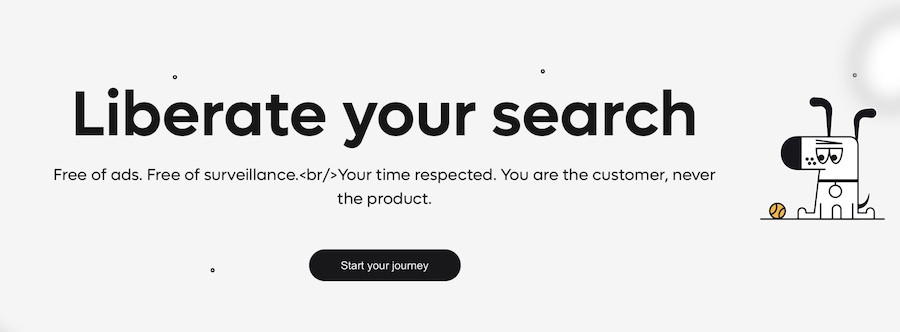
But instead of freaking out, my and everyone else’s reaction was to simply laugh. It felt almost like on-brand - after all being quirky and imperfect is something we readily admit. We let it sit for a day or two (we were in the middle of a team retreat) until we saw it become a joke on social media, and then did something about it…
A delegation from Kagi recently visited Japan, and one of the highlights was a meeting with one of the largest companies in Japan (and in the world) to demonstrate the benefits of Kagi Search and Kagi Translate for the Japanese market. The meeting, as intimidating as it could be for us, instantly turned into a joy fest once we found out that the main representative from the company was a Kagi user! They basically did the sales pitch for us. We may not be mighty in user numbers, but are mighty in representation!
And then meeting the amazing local Kagi user community in Tokyo was surely the highlight of the trip. Here is how all that felt:
The team grew to ~40 people and the best thing about it are our team retreats. They are awesome and feel like meeting old friends even though many times people would see each other for the first time given our fully remote, global team nature. We continue to be extremely selective with whom we hire, needed to maintain this very high ambition with a relatively small team.
As of writing this, we are at almost 50,000 customers! You know what that means - there will soon be a Kagi surprise!
We are happy to report that we have been break-even profitable since this time last year. That means we are not going anywhere!
This all reinforces a notion that I would like to share - I want this cozy feeling to last. Our ambition is to get to 5 million customers (which would get Kagi to $1bn in revenue) and do so with a team of less than (half of) Dunbar’s number of people. I believe we can get there in between 5 to 9 years if things do not change much.
If you would like to be a part of that journey as more than a customer, or a team member, we may have a fundraise down the road.
Live AMA
Join us for a live AMA on Discord all about Kagi — happening Thursday, June 12th at 9 AM PST!
We’re collecting questions in advance, so feel free to share yours here.
Can’t make it live? A recording will be available afterward on our YouTube channel.
FAQ
Q. What is the 50,000 members Kagi Surprise?
A. Find out next week!
Vlad & the Kagi team
vlad@kagi.com